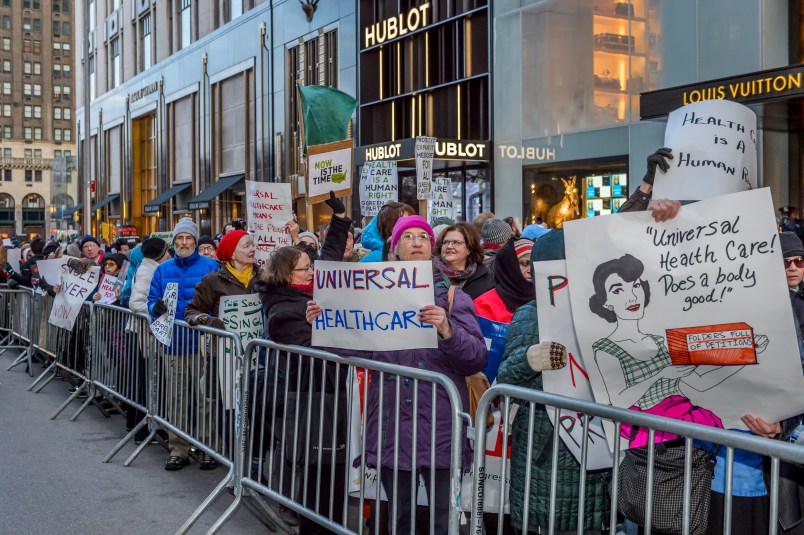WASHINGTON (AP) — A sobering report to governors about the potential consequences of repealing the Obama-era health care law warns that federal spending cuts probably would create funding gaps for states and threaten many people with the loss of insurance coverage.
The Affordable Care Act has two main components for expanding coverage: subsidized private health insurance available in all 50 states, and an optional Medicaid expansion that has been accepted by 31 states and the District of Columbia. Those two components of the health law cover more than 20 million people.
A report by the consulting firms Avalere Health and McKinsey & Company concluded that the changes under consideration by the GOP-led House would reduce significantly federal dollars for Medicaid and subsidized private insurance.
The effect on Medicaid would be far-reaching. The federal-state program for low-income people covers more than 70 million Americans, many of whom have high health-care needs.
The Associated Press obtained a copy of a slide presentation made by the consultants to governors meeting this weekend in Washington.
The report said the combination of phasing out Medicaid expansion money from the U.S. government, plus transforming the overall program from an open-ended federal entitlement to one that operates under a cap would likely result in state funding gaps. States that expanded Medicaid would face the deepest cuts.
States would get more flexibility to design their programs, but the money crunch could lead to cuts in eligibility, benefits, or payments to hospitals and other service providers. The impact of federal spending reductions would compound over time.
Reduced Medicaid spending could also hurt states with dampened economic activity and fewer jobs, the consultants said. Hospitals, which benefit from Medicaid coverage, are big employers in local communities. Costs of care for uninsured patients could become an issue.
In addition, the private insurance subsidies provided under Obama’s law would also be scaled back, according to the report.
Although states would get some additional safety-net funding, reductions in federal insurance subsidies would expose some consumers to new costs for their coverage. That would probably result in fewer people covered, as some consumers drop their plans.
According to the Kaiser Family Foundation, Medicaid consumed an average 19 percent of state budgets in 2015, the most current year available, ranging from 7 percent in Utah to 41 percent in New Hampshire.
Budget hawks including House Speaker Paul Ryan, R-Wis., support the kind of program flexibility GOP governors are seeking, but chiefly want to spend less on Medicaid.
Gov. John Kasich, R-Ohio, said he thinks “there’s going to be a problem in the House of getting anything out of there that still provides coverage to people. That’s why the Republicans have to reach out to some of the Democrats. I don’t know whether this is going to happen,” he told CBS’ “Face the Nation.”
Governors on Saturday met privately with Health and Human Services Secretary Tom Price, who according to several of the state leaders said the Trump administration wanted to work with states to overhaul health care, but he did not provide specifics.
A Medicaid proposal by GOP governors, a draft of which was obtained by the AP, urges Congress to change Medicaid from an open-ended federal entitlement to a program designed by each state within a financial limit.
Some of the governors behind the proposal, including Kasich, opted to expand Medicaid in their states despite pressure from conservatives.
“I think there are some very conservative Republicans in the House who are going to say just get rid of the whole thing. And that’s not acceptable,” he said.
He added: “Republicans can go and do what they want, and I’m going to talk to them. But at the end of the day I’m going to stand up for the people that wouldn’t have the coverage if they don’t get this thing right. And I happen to believe that the best way to get this right over time is for actually both parties to work together. I know that’s considered an impossibility now, but what’s at stake is not some political thing. What’s at stake here are 20 million Americans.”
Copyright 2017 The Associated Press. All rights reserved. This material may not be published, broadcast, rewritten or redistributed.







Frankly I just gave up 100% at the unbelievable election of Trump as POTUS. Apparently pain, suffering, and yes deaths on an indisputable scale will open the eyes of tens of millions of ignorant voters. I say pull the trigger Republicans, let the whole system collapse and just own it! Once we’ve got everyone’s attention, we can move to single-payer or reinstate Obamacare. The suspense is killing me.
“Elections have consequences!”, someone once warned.
I’m with you jimtoday; let it go - ALL of it. No pre-existing conditions, no children on parent’s insurance. Only when it is felt personally will the impact of their vote become real.
Give them what they voted for and when it hits them personally, and they complain, be ever so sympathetic, but say, “I’m so sorry. But you voted Republican…”
In what world would political leaders aspire to cutting health insurance coverage by 30% and the distribute the few remaining crumbs to those they didn’t cut? I thought that we were better than this. All to save a few (ok, a lot) of bucks for the 1%.
@chicago11–“I thought that we were better than this.”
Turns out that some of us might not be.